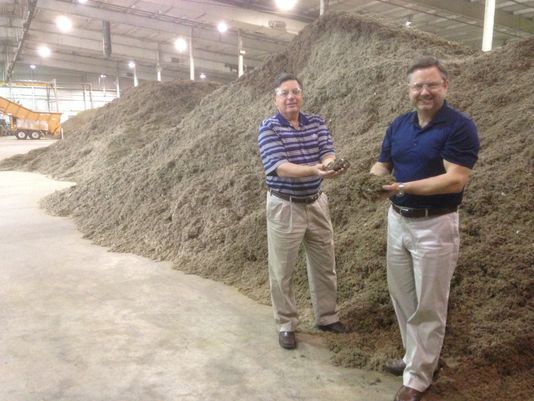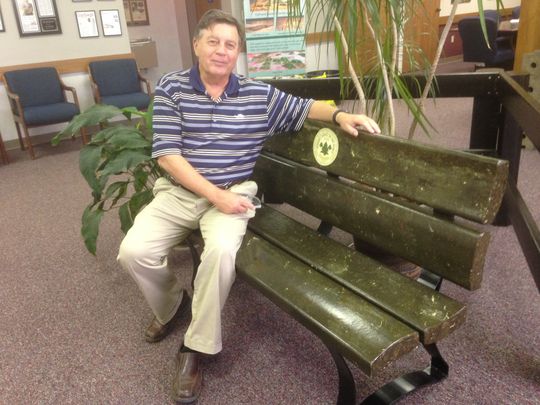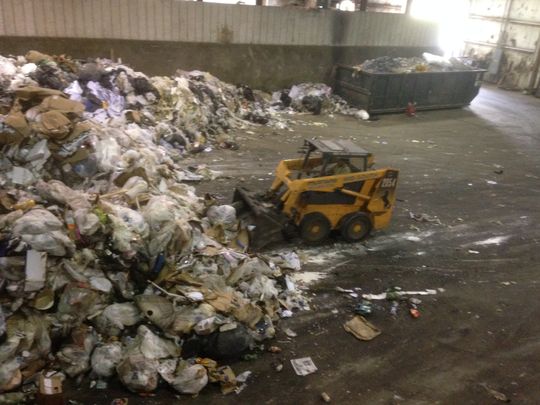
Mark Brown, right, the chief executive officer of WastAway, holds some of the fluff product made from trash while he and Terry Moore, the company’s chief business development officer, stand before piles of fluff at their warehouse in Warren County. WastAway uses the fluff to create fuel and potting soil products.
(Photo: Scott Broden/DNJ)
WastAway in Warren County shows it’s possible to create products from trash within a warehouse instead of dumping outside at Middle Point Landfill in Rutherford County.
“The average person in the the United States produces four pounds of garbage per day,” said Terry Moore, a WastAway chief business development officer who noted that at least 90 percent of that trash winds up in a landfill. “We can flip that upside down.”
WastAway collects a portion of Warren County’s garbage, uses a patented process that includes conveyor belts, shredders and magnets to pull out the metals and bakes the rest of the trash into a fluff material that’s used as a potting soil product or converted into fuel-source pellets.
Given that officials in Rutherford County expect Middle Point to close in about a decade, they’ve visited the WastAway plant to learn about the operation in Morrison, a town that’s southwest of McMinnville, as well as another solid-waste operation in Barnesville, Ga.
Three government representatives from Rutherford County also plan to attend a Renewable Energy from Waste Conference in Orlando Monday through Wednesday, said Mac Nolen, Rutherford County solid waste director. He’ll be traveling to Orlando with Jeff Davidson, the deputy to the county mayor, and Joey Smith, the Murfreesboro solid waste director.
After the conference, they plan Thursday to visit the Harvest Power Orlando Energy Garden to learn more about composting solutions, Nolen said. The solid waste officials also plan to travel to Edmonton in 2016 to see how that city in western Canada handles its trash and recycling.
“What we’re trying to do is find a solution before then,” said Nolen, who hopes Rutherford’s five governments for the county, Murfreesboro, Smyrna, La Vergne and Eagleville will form a solid waste authority in 2016 to oversee what do do with trash, recycling and composting in the future.
Murfreesboro and Rutherford County at this time haul 80,000 tons of trash per year to the private Middle Point Landfill on East Jefferson Pike, north of the city. When counting the trash collected by private haulers, Rutherford County is sending 258,000 tons of trash to Middle Point, Smith said.
Fast-growing Rutherford County reached a U.S. Census estimated population of 288,906 in 2014. The population by 2035 is projected to reach 489,827, according to the Tennessee Data Center, which is part of the University of Tennessee’s Center for Business & Economic Research at the Knoxville campus.
WastAway approach
If the the government officials in Rutherford County chose to contract with WastAway for the existing population, they could handle solid waste within about a 75,000-square-foot warehouse, and the total costs would be in the $30 million to $40 million range, said Mark Brown, the chief executive officer for the company in Warren County.
WastAway started in 2003. The company through 2008 handled all of Warren County’s waste and only created a potting soil product that McMinnville-area nurseries used from the fluff made from the trash. In order to make a profit, WastAway then started creating pellets that can be used as a fuel source.
“Fuel is worth more than potting soil,” Brown said.
Recycling advocate Bruce Wood of Nashville, however, opposes the company making a fuel source.
“Burning garbage, burning solid waste, is a waste of resources,” said Wood, who is president of BURNT (Bring Urban Recycling to
Nashville Today). “It goes right up the chimney. It’s not as profitable. It’s a one-time use. You can recycle things over and over. If you burn it, it’s a one time-use.”
WastAway officials contend their fuel pellets offer benefits to the environment.
“It’s a renewable fuel versus a fossil fuel that’s dug up out of the ground,” said Moore, whose company sells the pellets to power plants and metal kiln operations, as well as other industries testing to see if the WastAway fuel can be used in other processes.
The fluff product could also be used as one of the materials for asphalt and concrete and can also be used to make building materials, such as a bench that’s on display in the lobby of the warehouse in Morrison, Moore said.
“It has the potential to be 100 percent recycled,” Moore said.

Terry Brown, the chief business development officer at the WastAway warehouse plant in Morrison, sits on a bench made from trash that the company recycles into a fluff product. (Photo: Scott Broden/DNJ)
The company is working with governments and businesses in Alberta, Canada; Central America; South America; Australia; the Philippines, Malaysia; Italy; and other nations.
“We are in every continent but Antarctica,” said Brown, whose company negotiates with governments and businesses about buying the WastAway equipment and the training in how to use the technology.
Any agreement also involves once-a-year updated training in the use of the equipment or more often if needed, Moore added.
“We’d be right there the whole time guiding them,” Moore said.
In addition to the conveyor belts and magnets separating the metals that can be sold, the WastAway equipment also removes glass, rocks, gypsum and “other things that won’t burn,” Brown said.
Other steps could be added to take out cardboard, plastics or paper, Brown added.
Moore also touts how the WastAway process makes the separating of recycling materials easier.
“You don’t have to sort it at home,” Moore said. “You don’t have to put it on the curb. One truck can get it all.”
Curb-side recycling
Although WastAway boasts about the way it can sort out recycling materials, Murfreesboro eventually will add curbside recycling, said Smith, who oversees a city solid-waste operation that collects trash and brush in front of homes.
“That would be part of the solution,” said Smith, noting how the market for recycling products can be challenging.
It’s cheaper, for example, to make virgin plastics than to recycle the material at this time because of the low cost of crude oil, Smith said.
Another challenge is paper losing its value because of being co-mingled, he said.
Glass presents another problem because it cost money to recycle this material, but that method at least reduces a significant amount of weight that ends up dumped into a landfill, Smith said.
Broken glass also causes injuries to solid waste workers, Smith added.
“It’s very abrasive on your sorting equipment,” Smith said.
WastAway process
The trash at WastAway also goes through shredders and will be sterilized before it’s heated up to convert the waste into the fluff product.
“It explodes like a popcorn, and it looks different when it comes out,” Brown said.
The ideal location for a WastAway plant is in an industrial park such as the one the company uses to process solid waste in Morrison, Brown said.
“This was an existing building that we moved into,” said Brown, whose plant operates in a 100,000-square-foot warehouse and processes 50,000 tons of trash per day.
“Our neighbors never complain about the odor,” Moore said.

A WastAway employee operating a small bulldozer scoops up trash dumped into the warehouse in Morrison before transferring the waste to the area where the metals are separated for recycling. (Photo: Scott Broden/DNJ)
WastAway has convinced Rutherford County resident Denise Carlton that the company offers a Tennessee-based solution to replacing Middle Point Landfill, which is owned by Republic Services, a Phoenix-based, publicly traded corporation.
“It’s a big portion of the solution of unsorted household trash for the cost of a school,” Carlton said after completing a tour of the WastAway plant in Morrison.
Carlton also hopes the county will be able to find other solutions that lead to converting trash to renewable energy, such as the gassification plant approach that Lebanon is building with PHG Energy of Nashville.
“We have two Tennessee companies that can solve our problem,” said Carlton, an insurance consultant who resides in the rural Rockvale community southwest of Murfreesboro.
By Scott Broden | Originally published by Daily Journal News.